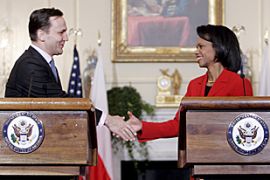Rice to sign Czech missile accord
Deployment of radar base to be confirmed despite objections by Russia.

“We have told them what we can do … There are still some issues, so I can’t say for certain what the trajectory is, but it was a constructive meeting,” Rice said before flying to Prague on Monday evening.
Analysts say the planned bases in the former soviet bloc would raise US security interests in the region at a time when Russia grows more assertive about its role on the global stage.
Russia sees the shield as a threat, and has said it will aim its nuclear missiles at central Europe if the shield is deployed.
The US says the 10 rockets are no match for Russia’s nuclear arsenal.
Czech opposition
But the plan still faces many hurdles, including widespread public opposition and tough ratification by the Czech parliament, where the three-party cabinet has just 100 seats in the 200-seat lower house.
Several backbenchers have declared they would vote against it.
The government must try to win over several independents to win the vote, which may possibly come only after a new US administration takes over from George Bush in January.
Disputes over the radar have alienated many Czechs, wary of any foreign military presence after the Soviet invasion in 1968 and the following two decades of occupation.
An opinion poll last month showed 68 per cent of Czechs were against the shield, while 24 per cent supported it.
Rice will also travel to Bulgaria and Georgia on her European trip this week.
Georgia visit
In another gesture that appears partly directed towards Moscow, Rice plans to visit the Georgian capital, Tbilisi.
US officials said she wished to demonstrate Washington’s support for Georgia’s political and economic reforms and its integration into Western institutions, including Nato.
Nato in April rebuffed US demands the ex-Soviet republic be put on an immediate path for membership but the Western security alliance made clear Georgia would one day join.
Rice’s visit to the Georgian capital follows months of escalating tensions between Tbilisi and Georgia’s breakaway region Abkhazia.
Just before Rice’s departure, the United States reaffirmed its backing of Georgia in the conflict.
“The United States reiterates its strong support for Georgia’s territorial integrity, and calls for an immediate halt to recent bombings on both sides of the cease-fire line in
Abkhazia, Georgia,” Sean McCormack, the state department spokesman, said in a statement.
The US has been dismayed by a series of steps that Moscow has taken towards Abkhazia and another breakaway region, South Ossetia, including Russia’s announcement that it would establish legal links with both and send more troops to
Abkhazia without Tbilisi’s consent.
Russia provides financial aid and has peacekeepers in Abkhazia. Georgia accuses Moscow of trying to annex the impoverished Black Sea region.